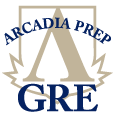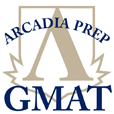Links
About Arcadia
LSAT Shorthand NotationArcadia Prep's GMAT CourseArcadia Prep's LSAT CourseArcadia Prep's SAT CourseArcadia Prep's GRE CourseThe Simply Brilliant GMAT AppAbout the MCATMCAT Physical and Biological SciencesAbout Arcadia Prep's MCAT CourseTerms of SaleTerms of UseAbout Arcadia Apps




LSAT Prep

If x and y are perfect squares, then which of the following is not necessarily ... ...
If x and y are perfect squares, then which of the following is not necessarily a perfect square?
(A)
x2
(B) ...
(C) ...
(D) ...
(E) ...
*This question is included in Nova Math - Problem Set A: Substitution
Replies to This Thread: 0 | ----
Can you also explain why E) isn't correct?
Replies to This Thread: 0 | ----
X^5 is also not a perfect square
Replies to This Thread: 1 | ----
Hi there. The keywords are "not necessarily". So if x^5 can be a perfect square, even if sometimes it is not a perfect square, then it is not the choice. For example, if x is 4, 4^5 is 1024, which is a perfect square of 32.
Reply 1 of 1
Replies to This Thread: 0 | ----
Posted: 01/29/2013 19:48
Replies to This Thread: 0 | ----
I am sorry, this confuses me, the question asks for one which is "not necessarily a perfect square" which means that the correct answer can at times be a perfect square and at other times not a perfect square; meaning (e) which can be a perfect square but can also not be a perfect square would be an appropriate answer right? Similarly with (x•y) where if we choose 4•16=54 which is not a perfect square but if we choose 4•9=36 then it is a perfect square, which again satisfies the "not necessarily" criteria...
Replies to This Thread: 0 | ----
Robert, the first explanation was not very good. The right way to answer this question is to ask: if we take the square root, will we get a whole number? Since x and y are perfect squares, we can see that the square root of answer choices ABCE will be whole, since they involve products of perfect
squares. Answer choice D however involves the sum of two perfect squares, and if we take the sqrt, the outcome is not necessarily a whole number. Btw, 4x16 is 64, which is a perfect square, not 54.
squares. Answer choice D however involves the sum of two perfect squares, and if we take the sqrt, the outcome is not necessarily a whole number. Btw, 4x16 is 64, which is a perfect square, not 54.
Replies to This Thread: 1 | ----
If x and y are perfect squares, then which of the following is not necessarily ... ...
Posted: 08/15/2013 13:36
How about 9+16=25?X+Y can be perfect square.
Echo, pay attention to "not necessarily".
Reply 1 of 2
Replies to This Thread: 0 | ----
Posted: 09/09/2013 07:37
Replies to This Thread: 0 | ----
Hi,so "not necessarily" here means it can be a perfect square and it can also be a non perfect square? It depends, right? Thanks

Reply 2 of 2
Replies to This Thread: 0 | ----
Posted: 09/13/2013 16:19
Replies to This Thread: 0 | ----
Yue Meng, yes.
Replies to This Thread: 1 | ----
If x and y are perfect squares, then which of the following is not necessarily ... ...
Posted: 12/23/2013 13:50
This question is confusing because it would lead one to believe that the ones which would turn out to not be a perfect square all the time would be the answer.... can you explain?
Reply 1 of 1
Replies to This Thread: 0 | ----
Posted: 12/23/2013 20:45
Replies to This Thread: 0 | ----
Mycal, this was explained before in the read so let me post again: the first explanation was not very good. The right way to answer this question is to ask: if we take the square root of the answers, will we get a whole number? Since x and y are perfect squares, we can see that the square root of answer choices ABCE will be whole, since they involve products of perfect squares. Let x = z^2, z is an integer, which means that x is a perfect square (of z). x^5 is z^10, and sqrt(z^10) is z^5, which is a whole number. E is always a perfect square.
Replies to This Thread: 1 | ----
If x and y are perfect squares, then which of the following is not necessarily ... ...
Posted: 10/21/2014 22:17
Where do you get numbers 4 and 9?
Reply 1 of 1
Replies to This Thread: 0 | ----
Posted: 10/21/2014 22:38
Replies to This Thread: 0 | ----
Chris, 4 and 9 are perfect squares of 2 and 3. We just use them to test the statements / choices, because they are easy to work with. We could have picked 625 or 1025, but they would be more difficult to work with.
Replies to This Thread: 1 | ----
If x and y are perfect squares, then which of the following is not necessarily ... ...
Posted: 01/07/2015 03:54
What's the perfect square ?

Reply 1 of 1
Replies to This Thread: 0 | ----
Posted: 05/22/2015 13:42
Replies to This Thread: 0 | ----
A perfect square is a square number, like 4, 9,16, 25, 36 ...
Replies to This Thread: 1 | ----
If x and y are perfect squares, then which of the following is not necessarily ... ...
Posted: 02/10/2015 07:37
How do you know to chose 4 & 9?

Reply 1 of 1
Replies to This Thread: 0 | ----
Posted: 05/22/2015 13:41
Replies to This Thread: 0 | ----
Kathy, you start with the simplest numbers, like 2 or 3, for plugging in, because they are the easiest to work with.





